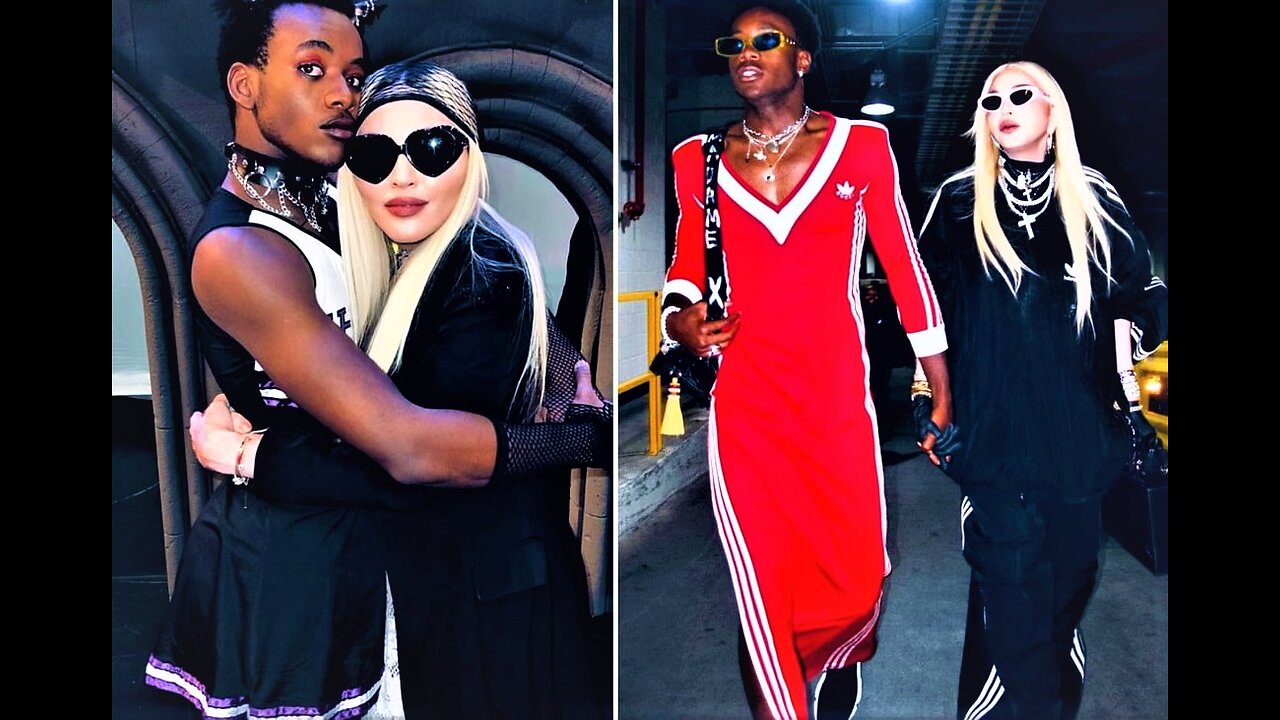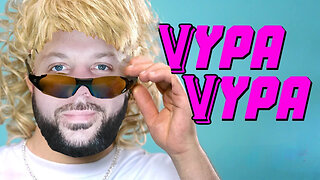Premium Only Content

Madonna Accused Of Child Trafficking In Malawi, Ethiopian World Federation
Satan has once again wormed his way into the music industry to get at those precious young eyeballs helplessly gobbling up the sin
The satanic panic is full-on back in music because, well, panic is back in general, thanks to 24-hour news networks and social media. If this sounds trite, it's because it's not a new take and it never really went away.
This fear cycle feels a lot like a never-ending episode of Stranger Things.
The 1980s were marked by an epidemic of satanic claims that made up the infamous "Satanic Panic" among parents who believed wild stories about human sacrifices and blood rituals fueled by popular music.
These, of course, turned out to be not even remotely true.
The whole affair was just the latest in a long line of generational scapegoats that adults use to blame the next generation — see also:
horror comics, video games and Dungeons & Dragons.
The Satan chatter has been so repetitive it's like when a rapper samples another rapper's music except it's Donald Trump Jr. on a cocaine binge parroting words from old episodes of Geraldo.
Just got introduced to Sam Smith & Kim Petras through The Grammys. Both beyond talented! Such a bad ass song & performance. If I ever do become a wrestler this would be my entrance theme.
Here are some of the artists accused of working for Satan just in the past month or so:
Sam Smith and Kim Petras at the Grammys
This year's winner for best pop duo broke new ground as Petras became the first openly transgender woman to win a Grammy.
Unfortunately, all of that was overshadowed because all anyone could talk about it is how the pair's performance of the song "Unholy" was choreographed, designed and probably even catered by Satan.
Rep. Marjorie Taylor Greene and, yes, even that "wascally wabbit," Texas Sen. Ted Cruz. It's all because Sam Smith wore (gasp!) a red top hat with horns on it, the stage was (GASP!) surrounded by fire and the entire scene was doused in (AUGH!) red light.
Let's just say for a minute that this was the work of Satan trying to influence impressionable young minds, which it wasn't since the song is actually about the pain of marital infidelity and struggling to maintain an identity in a world full of judging eyes.
Satan could've been more obvious about it, maybe hung a huge neon sign over the whole thing reading, "Satan is behind this!" Satan also wouldn't have dolled Smith up in a Spirit Halloween devil costume. The Devil wears Prada, people. Walsh, Greene and Cruz must get triggered every time they see a Dirt Devil vacuum or a New Jersey Devils game.
Still not over this nearly minute-long, uninterrupted, continuous shot from Rihanna’s halftime show. It’s pure art. pic.twitter.com/RH0DLPW1Uz
— Nate Morris (@_natemorris) February 13, 2023
Rihanna's Super Bowl Halftime Show
Remember when a Black female performer had to accidentally and partially expose herself to get people mad about a halftime Super Bowl show?
These days, you could get criticized for putting on too many layers during your performance.
Rihanna's medley performance, which included her signature hit "Umbrella," got called up for being a part of Satan's toolbelt for some reason.
At least with Rihanna's performance, you had to do some actual digging instead of just pointing at the nearest thing in horns and yelling "Satan!" This time, former Dallas TV reporter turned Newsmax pundit Grant Stinchfield — who once smashed a TV for the now-defunct NRA TV network — was one of the louder voices yelling about Rihanna's performance.
He linked it to Satan by pointing out that Rihanna was DRESSED IN RED while "people dressed in white like angels" fell from the sky, which he interpreted as a reenactment of Ezekiel 28:12–17 from the Bible when God cast Lucifer down from the heavens. Wait till he learns about biblical art.
And Rihanna was pregnant! Just change her name to Rosemary already.
So if simply wearing red makes you the Devil, is Stinchfield going to demand a recall of all of those MAGA hats? What about Donald Trump's signature red tie?
Off with Lindsay Lohan's head!
We hate to break it to some ... Southern residents, too, but some of your necks gots to go.
Madonna's Grammy Speech and Vanity Fair Photo Shoot
There's just no pleasing some people. Even if a pop artist comes out in favor of spirituality or religion, some loudmouths will only focus on the superficial while also telling us to look at a deeper, more sinister meaning. It's the intellectual equivalent of naming your dog "Stay."
Madonna recently posed for the cover of the Italian edition of Vanity Fair, which included an in-depth interview about her career and music.
Asked about her relationship with religion, she said that it's "important to have ritualistic behavior and a spiritual life" and that a life with religion that doesn't prompt "understanding, knowledge, curiosity and inclusivity" is not a religion.
Of course, that didn't stop Daily Wire talking head Candace Owens from jumping down Madonna's throat for mocking Christianity and putting "the demonic nature of everything you represent by using Christian imagery" because she dared to dress up like the Virgin Mary and recreate Leonardo Da Vinci's "The Last Supper" in her own image.
Who knew it only took a high-powered iPhone and a costume rental to invoke the name of Satan?
Doja Cat's Wardrobe
This one is amazing because it has nothing to do with music, the most popular culprit for alleged satanic influence. Apparently, Satan also has a bitchin' tailor.
YouTuber turned pop star Doja Cat has been dodging satanic accusations for a long time, and her most recent run-in with the red menace came about a month ago during Paris Fashion Week when she showed up to Schiaparelli's fashion line rollout studded from head to toe in red Swarovski crystals.
The outrage started when people on Twitter realized the entire line was inspired by Dante's Inferno, a story about one man's journey through heaven and hell, which isn't actually connected to any religious texts or canon.
It's like claiming Spider-Man fanfiction is part of the Marvel Cinematic Universe.
Demi Lovato's Albums and Advertisements
This one really hurts because Demi's a hometown hero, but an actual government is involved in connecting the singer with the Prince of Darkness.
Lovato's new album Holy Fvck features the singer in some light bondage wear lying on a cross, and the U.K. decided to ban the album's cover and any posters advertising because it's "likely to cause serious or widespread offence" and "the ad was irresponsibly placed where children could see it," according to the U.K.'s Advertising Standards Authority.
Were they plastering posters in hospital nurseries or those ball pits at McDonald's? Remember when England had naked women doing the news?
Madonna Accused Of Child Trafficking In Malawi
Madonna is being accused of trafficking and sexually exploiting Malawian children by a charitable organization known as the Ethiopian World Federation
Pop singer Madonna is being accused of human trafficking and sexually exploiting children by a charitable organization known as the Ethiopian World Federation (EWF), according to AllAfrica.
As stated on the federation's website, the EWF is "a civic service organization that pushes policies and advocates to change the laws that harm all Black People."
Madonna herself famously adopted four children from Malawi, a landlocked country located in southeastern Africa.
In 2006, Madonna founded a charity called Raising Malawi, a non-profit group that seeks to support orphans and vulnerable children through health and education programs.
The EWF is asking Malawian President Lazarus Chakwara to investigate Madonna's charity and "restrict her and her associates accessibility to Africa and to African children as a precautionary measure until a thorough investigation is done into child trafficking, sex exploitation, sexual slavery, adoption reversal, threat of coercion, fraud, deception and abuse of power or vulnerability."
Madonna's 1992 book titled Sex was cited in the petition, which features adult content, softcore porn, and sadomasochism.
Pornographic content and LGBTQ conduct is punishable by law in the country of Malawi. "Gay porn stars were photographed in pornographic pictures with Madonna performing vulgar sex acts with the same sex which should have been disclosed during her adoption case in 2006 in Lilongwe, Malawi," the EWF's petition writes.
It continues, "Madonna had to sign a contract that forbade the book from including images of child pornography, bestiality, or religious imagery. Shortly after signing that agreement, Madonna founded a company called Maverick, a partnership with Time Warner.
She now holds total artistic control over any work released by Maverick, who is now the book's publisher.
The agreement she signed with Time Warner with the sexually explicit content in the book Sex was null and void."
The petition argues that the "psychology" behind Madonna's ability to "release child pornography, religious imagery, bestiality and vulgar pornography has prompted her to open an orphanage in Malawi named 'Raising Malawi' in 2006 to host social experiments on vulnerable African children in Malawi."
The group suggests that the singer is using her Malawian adopted son, David Banda, "for sexual exploitation and social experiments." The petition cites the photos of David wearing women's clothes, makeup, and jewelry.
The EWF also alleged that Madonna falsely claimed David’s dad of being absent when she applied for his adoption.
Madonna adopted more kids from Malawi after David – in 2009, after battling in court, the singer was finally approved to adopt Mercy James.
She adopted a set of twins, Estere and Stella, in 2017.
The plea further states, “We firmly believe that Malawi has been robbed of its most precious resource – its children,” it continues, “In 2013, the country accused Madonna of ‘bullying’ state officials and making diva demands – and of citing her Raising Malawi charity as the reason for doing so.”
This Is Not the First Time Madonna Has Been Accused of Child Trafficking
In 2009, Madonna was accused of child trafficking when the Malawi court rejected her bid to adopt a second child. In her ruling, Judge Esimie Chombo warned people against celebrity adoptions, stating that they could lead to child trafficking. “Anyone could come to Malawi and quickly arrange for an adoption that might have grave consequences on the very children that the law seeks to protect,” she said.
The court eventually ruled in favor of Madonna after she filed an appeal in 2009.
Mercy's grandmother, Lucy, shared her heartbreaking side of the adoption process.
Lucy placed Mercy in a local orphanage for care until her immune system improved, but never intended to permanently part ways with her granddaughter.
Mercy's family said they would let Madonna adopt her only until she was of grade-school age, and that she'd return to Malawi every two years for visits.
The “Material Girl” singer did eventually return to Malawi, but she never took Mercy to her grandmother – even though Lucy was reportedly at her deathbed begging to see her.
Madonna's lawyers addressed the matter in 2011, admitting that Mercy's family "had no legal right to see her."
Mercy's biological uncle, Peter Baneti, signed the adoption papers after he and Lucy were told the little girl would be brought home regularly for visits. "I was the one who signed off the adoption papers," Peter said. "She told me herself that she didn't want Mercy to cut ties with her roots, that she'll be bringing her home regularly."
Mercy's family seemed to echo David's father and his claims on Madonna's broken promises: "The only reason I let Madonna adopt David was because she promised me she would give him a good education and then he could come home to live with me," he said.
The twins' father, Adam Mwale, claims he was misled throughout the adoption process, and was told from the beginning that his daughters would be returned to him. "I was told from the start that Esther [Estere] and Stella were going to a rich woman’s home abroad, that she would give them a good education, then return them to me, to live with me and help all of my family."
He continued, "Now you are telling me the adoption is permanent. That cannot be true – I don’t want it to be true. I am their father, and I will always be their father."
It seems Madonna has a history of disrespecting the natives of Malawi. In 2012, the singer announced that she was planning on building schools in Malawi that would educate at least 1,000 kids a year.
The spokeswoman for Malawi's Ministry of Education, Lindiwe Chide, insisted that Madonna often acted behind authorities' wishes, adding that she was "fed up" with the pop star. "Now she decides to announce that she plans to build 10 schools without getting authority from us again," Lindiwe said.
Have you ever seen a movie made before the year 1968? Hollywood at this time was subject to the rigors of a government-directed policy, the Motion Picture Production Code, also known as the Hays Code.
Among other things, the Hays Code prevented films from depicting sex scenes, or more specifically, “lustful kissing” and “scenes of passion.”
Things conclude in fireworks or fade to black before the couple takes things further, and this is the way love scenes were handled on-screen for decades.
Actors didn’t have to simulate intercourse to get a point across, and audiences everywhere weren’t subjected to awkward, intrusive scenes.
Cut to 60 years later. Sexually explicit shows like Game of Thrones and Euphoria (which is inarguably marketed to teenagers) dominate streaming services and depict graphic and even disturbingly violent sexual encounters.
We no longer have the censorship of the Hays Code; anyone would look at that fact alone and call it progress. But are we actually better off?
Shows and movies today often pride themselves on having on-set “intimacy coordinators” who choreograph and direct their sex scenes.
This kind of endorsement of what’s essentially pornography on television is all thanks to a recent movement known as “sex positivity.” Sex positivity as a basic concept is not inherently harmful, but it’s often appropriated to accommodate harmful agendas and push destructive rhetoric.
In an age with sex on TV and growing discussions on sex education where young children are concerned, it’s time we examine what sex positivity is and what it isn’t.
Is It Acceptance, or Something Else?
What is sex positivity? One New York Times writer summarizes it as “[privileging] sexual pleasure and [fighting] sexual repression.” At first blush, we all want to be sex positive. Who wants to be sex negative? But in a culture largely dominated by a quantity-over-quality approach to sex, we make ourselves vulnerable to disillusionment on sex and monogamy when taking meaningless hookups over committed relationships.
Advocates often point to the sexual mores and puritanical attitudes of yesteryear as the reason for the push for and the value of sex positivity. In an ideal sense, sex positivity values sexual pleasure, encourages open and honest discussions about sex, and urges emotionally vulnerable communication between partners.
t motivates the adoption of advantageous sexual practices, like sexual selectivity, and dispels cultural myths around it through honest examinations of things like hookup culture.
It encourages healthy formation of self-esteem in relation to your body and your acknowledgment of yourself as a sexual being, and celebrates sexuality as a healthy and joyous expression of the human existence.
If sex positivity began and ended there, we might be better off. But as we’re pushed to accommodate all identities, all lifestyles, and all expressions – or else be punished for failing to do so – sex positivity has come to encompass things like idolatrous observances of sex work and pornography.
Consent, even when it fails to protect people from exploitation and degradation, is held as the highest standard possible.
Yet even the most “sex positive” individual can consent to a sexual act and still find themselves demoralized and humiliated after the fact.
Sex positivity should not indicate blanket acceptance of each and every preference and practice.
In accepting sex positivity as we know it through an egalitarian lens, we’ve had to reject certain notions now relegated as harmful or stereotypical. We’ve been forced to detach consequence and emotion from intercourse, as well as the basic truth that there can be negative side effects to sex as seen in a no-holds-barred manner.
This kind of thinking impacts everyone, even our kids.
Sex Positivity in Action
It’s not enough to be sex positive in marriage or monogamy. It’s not enough to point out the very real outcomes of casual sex, which sex positivity often calls “slut shaming.” It’s not enough to educate our children on sex according to our diligence and discretion as parents, or to try to shield them from the deleterious effect of porn on a young psyche.
Take so-called “female pleasure.” Sex positivity advocates – the majority of whom unsurprisingly identify as feminists – uphold female pleasure, which they feel was previously overlooked, as the highest achievable goal a woman can attain during sex. This concept is so dogmatized that even in our capability to see pornography as a corrosive ill which should be wiped from humanity, there are calls now more than ever for “female-centered” and female-directed pornography.
Then, there are the effects of sex positive activism. In a docuseries on Bill Cosby, one sex therapist argued that “in an idyllically sex positive world, someone [would be] able to pay conscious women to come and be drugged” so that a rapist “can get their kink out” in a “consensual” way.
According to this activist, sex negativity, not a deviant want for power and control, is what causes rape. This particular instance shines a light on what sex positive activists really think of people as sexual beings, especially women – they view them as bodies without consciousness built for someone else’s depraved pursuit of pleasure, and nothing more.
Children are not immune to sex positivity in action, either.
Though sex positivity advocates and proponents would argue that labeling this behavior as “grooming” is inaccurate, parents of the nearly 50 million children in public schools are now facing the possibility that their children will learn about sex in an environment unsanctioned by parents and influenced by more than questionable motivations.
One father experienced this firsthand when his 11-year-old daughter was assigned a book on a young boy going through gender transition.
The book, which the father looked through after his daughter questioned him about it, features descriptions of pornography and masturbation. Parents are quickly learning that sex positivity isn’t limited to age-inappropriate discussions on certain topics – they also include the problematic gender theory that runs rampant in academia, and now in elementary schools.
Even outside school, kids are still preyed upon by contentious gender studies discourse masquerading as education and empowerment.
Just last year, a self-described “sex education coalition” offered a summer camp for minors, which featured topics like “self-managed abortions,” “gender exploration,” and “being a sex worker.” The coalition also hosts a program where 13-year-olds discuss sexual preferences and practices with adult co-participants.
Sex positivity on paper looks like an admirable undertaking – if only its sole purpose was to dispel embarrassment and shame around the topic.
But since its ratification of questionable gender theory and the emphasis placed on “educating” minors, it’s evident that, in practice, this concept could not be more malevolent.
Anyone rightfully concerned with the direction of our cultural attitude toward sex, as well as the well-being and safeguarding of their children, would argue that we need to eradicate sex positivity, and this is true to an extent. We need to eradicate sex positivity as we know it now in order to reclaim it.
We can be vocal in our friend groups about the benefits of monogamy and shut down virgin-shaming.
Sex positivity should not indicate blanket acceptance of each and every preference and practice, though it’s come to mean exactly that. Not every sexual proclivity – especially where children are even remotely concerned – needs to be celebrated. We first reclaim sex positivity by affirming what we know to be harmful, perverse, unhealthy, and ultimately destructive.
Second, it’s incumbent upon us to decidedly take charge of how our children are educated on sex and by whom.
If children know that their parents are a trusted place of refuge where they can discuss sensitive topics and ask personal questions, they’ll be less likely to turn to a different source, whether another adult, someone their own age, or the media, to help walk them through understanding things.
We’ve put off this responsibility for too long, whether due to our own shame around the topic or even laziness. If we don’t talk to them, someone else will, and they’ll do it with their own agenda in mind.
We can practice positive attitudes toward sex both individually and in our relationships as well. As individuals, we can refrain from falling prey to the deleterious effects of porn on our mental state and our sex life, and avoid using sexually graphic content as a barometer for how our own intimacy should be.
We can communicate with our spouse about our preferences and our stressors and help them understand our perspective on sex while learning theirs as well. We can be vocal in our friend groups about the benefits of monogamy and shut down virgin-shaming. We can also quit perpetuating the long-held belief that you need to be sexually exploratory or transgressive, to an uncomfortable or unhealthy degree, to have a satisfying sex life.
-
 10:04
10:04
Space Ice
3 hours agoThe Movie Silent Hill Is Like Resident Evil Without The Good Parts - Worst Movie Ever
14.1K4 -
 5:49
5:49
Hannah Barron
23 hours agoRedneck Euro Mount
12.8K19 -
 32:34
32:34
hickok45
8 hours agoSunday Shoot-a-Round # 268
8.81K8 -
 27:33
27:33
The Finance Hub
17 hours ago $6.33 earnedBREAKING: ALINA HABBA JUST DROPPED A MASSIVE BOMBSHELL!!!
28.6K58 -
 40:23
40:23
PMG
22 hours ago $0.62 earnedHannah Faulkner and Dr. Michael Schwartz | EXPOSING BIG PHARMA
16.2K1 -
 18:55
18:55
GBGunsRumble
19 hours agoGBGuns Range Report & Channel Update 15FEB25
11.5K -
 13:31:32
13:31:32
iViperKing
20 hours agoGood Times + Good Energy Ft. Whez.. #VKGFAM #RRR
99.2K13 -
 12:24
12:24
Winston Marshall
1 day agoWOAH! Bannon just Revealed THIS About MUSK - The Tech-Right vs MAGA Right Civil War Ramps Up
225K309 -
 7:33:46
7:33:46
Phyxicx
19 hours agoRaid & Rant with the FF14 Guild on Rumble! Halo Night just wrapped up! - Go Follow all these great guys please! - 2/15/2025
151K4 -
 10:42:19
10:42:19
Reolock
21 hours agoWoW Classic Hardcore (LVL 60) | RAID DAY | Rumble FIRST HC Raid
97.3K5